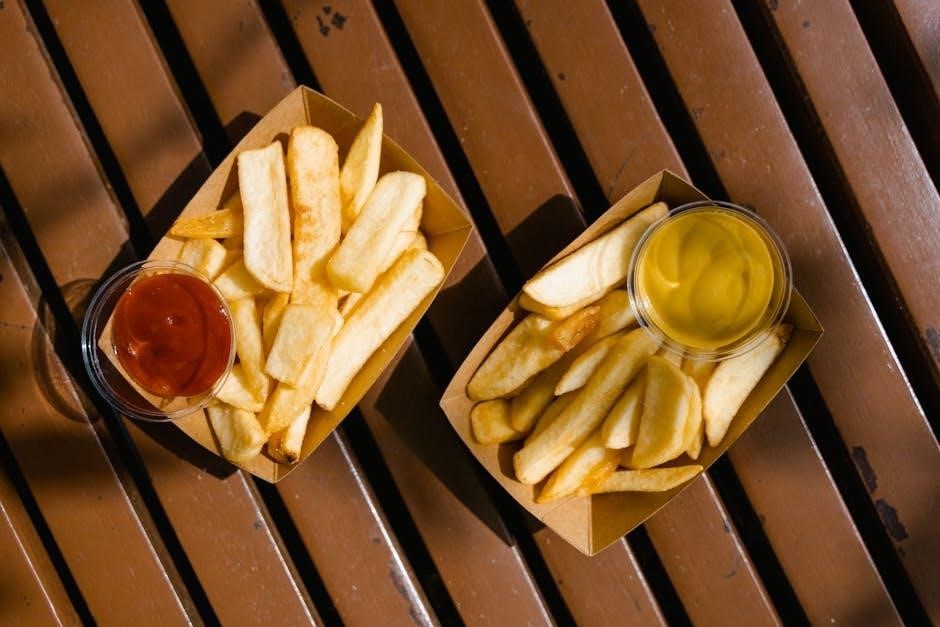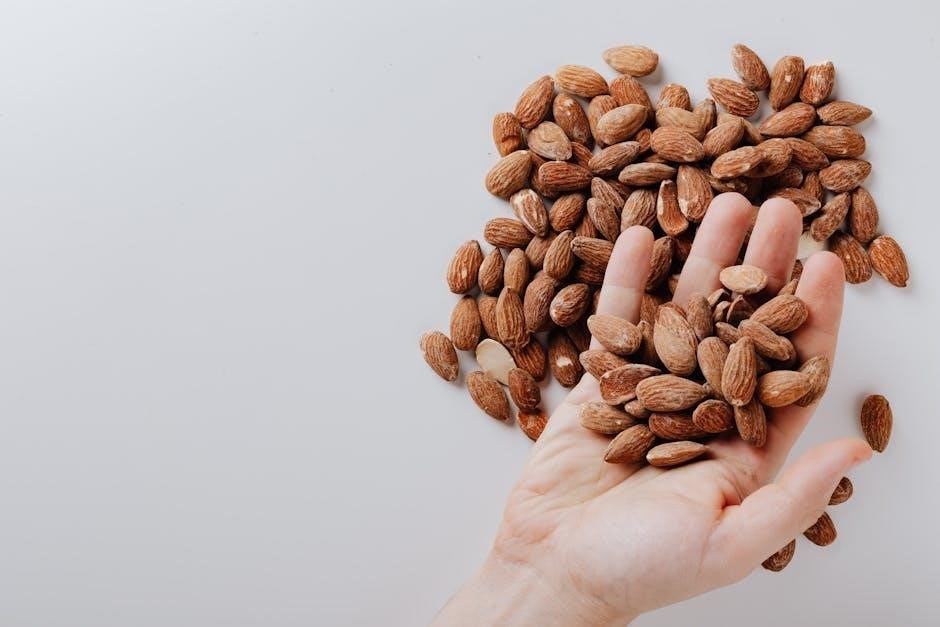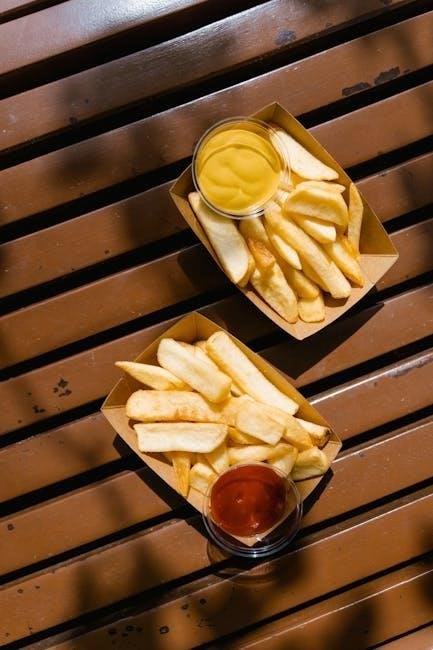
A 3500-calorie meal plan is designed for those seeking to gain weight and build muscle‚ offering a balanced intake of protein‚ carbs‚ and healthy fats to support muscle growth and energy needs.
1.1 Why a 3500 Calorie Meal Plan is Ideal for Weight Gain and Muscle Building
A 3500-calorie meal plan is ideal for weight gain and muscle building as it provides a calorie surplus necessary for lean muscle growth. It ensures adequate energy for intense workouts and recovery‚ with balanced macronutrients to support muscle repair and strength. This plan is flexible‚ catering to individual needs‚ and emphasizes nutrient-dense foods to promote overall health and performance.
1.2 Importance of a Balanced Diet in a High-Calorie Meal Plan
A balanced diet is crucial in a 3500-calorie meal plan to ensure nutrient needs are met. It combines protein‚ carbs‚ and fats to support muscle growth and energy. Without balance‚ high-calorie intake can lead to nutrient deficiencies or excess empty calories‚ potentially causing health issues. A structured plan with whole foods promotes optimal health and performance‚ avoiding digestive problems and unwanted fat gain. Balance ensures sustainability and effectiveness for long-term goals.

Understanding Macronutrients in a 3500 Calorie Diet
Macronutrients—carbohydrates‚ protein‚ and fats—are essential for a 3500-calorie diet. They provide energy‚ support muscle growth‚ and maintain bodily functions‚ ensuring a balanced and effective meal plan.
2.1 Role of Carbohydrates in a High-Calorie Diet
Carbohydrates are the primary energy source in a 3500-calorie diet‚ comprising about 47% of total calories. They fuel workouts‚ support muscle function‚ and aid recovery. Complex carbs like oats‚ rice‚ and whole grains are ideal‚ providing sustained energy. Additionally‚ carbs play a crucial role in muscle recovery and growth‚ making them essential for athletes and bodybuilders aiming to build lean muscle mass and maintain high energy levels throughout the day.
2.2 Importance of Protein for Muscle Growth and Repair
Protein is vital for muscle growth and repair‚ accounting for 26% of calories in a 3500-calorie diet. It provides essential amino acids to build and repair muscle tissue‚ crucial for athletes and bodybuilders. Aiming for 200g of protein daily ensures adequate muscle synthesis and recovery. Sources like lean meats‚ fish‚ eggs‚ and protein powders are ideal‚ helping to promote lean muscle gain and maintain muscle mass during intense training and recovery phases.
2.3 Healthy Fats: Their Contribution to Caloric Intake
Healthy fats are crucial in a 3500-calorie meal plan‚ contributing significantly to caloric intake due to their high energy density. They provide 9 calories per gram‚ making them an efficient way to meet daily calorie goals. Sources like avocados‚ nuts‚ seeds‚ and olive oil are rich in healthy fats‚ supporting hormone production and vitamin absorption. Incorporating these fats ensures a balanced diet and helps maintain energy levels throughout the day‚ while avoiding unhealthy‚ empty-calorie options.

Daily Meal Breakdown for a 3500 Calorie Diet
A 3500-calorie diet is typically divided into 5-6 meals‚ including breakfast‚ snacks‚ lunch‚ dinner‚ and an evening snack‚ ensuring balanced nutrition and consistent energy levels.
3.1 Breakfast Options: High-Calorie‚ Nutrient-Dense Recipes
Breakfast is a crucial meal in a 3500-calorie diet‚ providing the energy needed for the day. High-calorie options like oatmeal with protein powder‚ berries‚ and nuts‚ or pancakes with syrup and butter‚ are ideal. These meals are rich in carbs‚ protein‚ and healthy fats‚ ensuring a balanced start. Recipes often include egg dishes‚ whole-grain cereals‚ and dairy products to meet nutritional goals. A hearty breakfast helps kickstart metabolism and supports muscle growth‚ making it a foundational part of the meal plan.
3.2 Mid-Morning Snacks to Maintain Energy Levels
Mid-morning snacks are essential to maintain energy levels and prevent hunger between meals. High-calorie options like nuts‚ dried fruits‚ or a protein smoothie with peanut butter are ideal. These snacks provide a quick energy boost and contribute to the overall calorie intake. Incorporating healthy fats and proteins ensures sustained energy without relying on empty calories. Snacks should be nutrient-dense to support muscle growth and keep metabolism active throughout the day.
3.3 Lunch Ideas: Balancing Protein‚ Carbs‚ and Fats
Lunch should be a calorie-dense meal‚ providing a balance of protein‚ carbs‚ and fats. Grilled chicken breast with brown rice‚ quinoa‚ or whole-grain pasta is an excellent option. Pairing lean proteins with complex carbs ensures sustained energy. Adding healthy fats like avocado‚ nuts‚ or olive oil enhances calorie intake. Incorporate vegetables for fiber and nutrients. A lunch might include 6 oz of chicken‚ 1.5 cups of cooked rice‚ and a side of steamed veggies‚ totaling around 700-800 calories. This meal supports muscle growth and energy replenishment.
3.4 Afternoon Snacks: Healthy‚ Calorie-Rich Choices
Afternoon snacks should be nutrient-dense and calorie-rich to maintain energy levels. Opt for a combination of nuts‚ dried fruits‚ and a protein bar‚ providing healthy fats‚ carbs‚ and protein. For example‚ a handful of almonds (150 calories) paired with dried fruit (100 calories) and a protein bar (200 calories) totals 450 calories. These snacks are easy to prepare‚ portable‚ and ensure sustained energy while supporting muscle growth and recovery. Avoid sugary or processed options to maintain nutritional balance.
3.5 Dinner Recipes: Completing the Day’s Caloric Needs
Dinner is a crucial meal for meeting daily caloric goals. Grilled steak with roasted sweet potatoes and steamed broccoli offers a balanced mix of protein‚ carbs‚ and fats‚ providing approximately 750 calories. The meal plan emphasizes flexibility‚ allowing customization to suit individual preferences. Adding a side salad with dressing can enhance both flavor and caloric intake. These recipes ensure a high-calorie intake while maintaining nutritional balance‚ helping to complete the day’s caloric requirements effectively.
3.6 Evening Snacks: Final Caloric Boost Before Bed
Evening snacks are a final opportunity to meet daily caloric goals. A protein shake with almond butter and whole milk provides a mix of protein and healthy fats‚ contributing around 500 calories. Greek yogurt with honey and mixed nuts is another high-calorie option‚ offering approximately 450 calories. These snacks not only satisfy cravings but also support muscle recovery and growth overnight. Timing snacks 1-2 hours before bed ensures proper digestion and maximizes their caloric contribution to the day’s total intake. Customize choices based on dietary preferences and caloric needs.

Weekly Meal Plan for a 3500 Calorie Diet
A structured 7-day meal plan with varied recipes‚ ensuring balanced nutrition and meeting the 3500-calorie goal. Each day includes breakfast‚ snacks‚ lunch‚ and dinner‚ customizable to preferences.
4.1 Monday: Sample Meal Plan with Recipes
Start your week with a balanced and calorie-rich menu. Breakfast: Oatmeal with protein powder‚ nuts‚ and berries (700 calories). Mid-morning snack: Greek yogurt with honey and granola (300 calories). Lunch: Grilled chicken breast‚ brown rice‚ and steamed vegetables (800 calories); Afternoon snack: Apple slices with peanut butter (250 calories); Dinner: Baked salmon‚ quinoa‚ and roasted sweet potatoes (850 calories). Evening snack: Cottage cheese with pineapple (200 calories). This plan totals 3500 calories‚ with a focus on protein‚ complex carbs‚ and healthy fats to fuel muscle growth and energy.
4.2 Tuesday: Varying Protein Sources and Carbs
Begin with scrambled eggs‚ whole-grain toast‚ and avocado (650 calories). Mid-morning: Mixed nuts and dried fruit (300 calories). Lunch: Grilled turkey breast‚ quinoa‚ and steamed broccoli (850 calories). Afternoon: Protein smoothie with banana‚ oats‚ and almond milk (350 calories). Dinner: Grilled steak‚ mashed potatoes‚ and green beans (900 calories). Evening: Hard-boiled eggs and cheese (200 calories). This day focuses on diverse protein sources like eggs‚ turkey‚ and steak‚ paired with complex carbs for sustained energy and muscle recovery.
4.3 Wednesday: Incorporating Healthy Fats
Breakfast: Avocado toast with scrambled eggs and a glass of orange juice (700 calories). Mid-morning: Almonds and mixed seeds (350 calories). Lunch: Grilled chicken breast with brown rice‚ roasted vegetables‚ and olive oil dressing (850 calories). Afternoon: Greek yogurt with honey and chia seeds (300 calories). Dinner: Baked salmon‚ quinoa‚ and steamed asparagus (900 calories). Evening: Dark chocolate and a handful of walnuts (250 calories). This day emphasizes healthy fats from avocados‚ nuts‚ seeds‚ and olive oil to support calorie intake and satiety.
4.4 Thursday: High-Fiber‚ High-Calorie Options
Breakfast: Oatmeal with peanut butter‚ banana‚ and chia seeds (750 calories). Mid-morning: Apple slices with almond butter (300 calories). Lunch: Whole-grain pasta with chicken‚ marinara sauce‚ and steamed broccoli (850 calories). Afternoon: Mixed berries with full-fat Greek yogurt (350 calories). Dinner: Grilled turkey burger on whole-grain bun with sweet potato fries (900 calories). Evening: Mixed nuts and dried fruit (300 calories). This day focuses on fiber-rich foods to aid digestion and sustain energy levels while meeting caloric goals.
4.5 Friday: Balanced Meals for Optimal Energy
Breakfast: Scrambled eggs with whole-grain toast‚ avocado‚ and orange juice (650 calories). Mid-morning: Greek yogurt with honey and mixed berries (350 calories). Lunch: Grilled chicken breast with quinoa‚ roasted vegetables‚ and olive oil (850 calories). Afternoon: Protein smoothie with banana‚ peanut butter‚ and whole milk (400 calories). Dinner: Baked salmon with brown rice and steamed asparagus (800 calories). Evening: Dark chocolate and mixed nuts (300 calories). This day balances protein‚ carbs‚ and fats for sustained energy.
4.6 Saturday: Adjusting for Weekend Activities
Breakfast: Oatmeal with peanut butter‚ banana‚ and whole milk (750 calories). Mid-morning: Protein bar and an apple (350 calories). Lunch: Grilled chicken wrap with sweet potato fries (900 calories). Afternoon: Trail mix with nuts‚ seeds‚ and dried fruit (400 calories). Dinner: Beef stir-fry with brown rice and mixed vegetables (850 calories). Evening: Ice cream with chocolate chips and almonds (300 calories). This plan accommodates weekend activities by providing sustained energy and flexible‚ portable meal options.
4.7 Sunday: Meal Prep for the Upcoming Week
Sunday is ideal for meal prepping to ensure a smooth week ahead. Prepare high-calorie‚ nutrient-dense meals like breakfast burritos‚ grilled chicken salads‚ and overnight oats. Portion out snacks such as trail mix and protein bars. Cook proteins like beef or chicken in bulk‚ and steam vegetables for easy reheating. This strategy saves time‚ ensures consistency‚ and helps maintain the 3500-calorie goal throughout the week. Customize meals based on personal preferences and dietary needs for optimal satisfaction and adherence.

Customizing Your 3500 Calorie Meal Plan
Tailor your 3500-calorie meal plan to suit your preferences‚ goals‚ and dietary needs while maintaining macronutrient balance for optimal results and sustainability.
5.1 Adjusting for Individual Caloric Needs
Caloric needs vary based on factors like age‚ activity level‚ and weight goals. Adjust the 3500-calorie plan by increasing or decreasing portions to meet personal requirements‚ ensuring a balance of macronutrients for muscle growth and energy. Tracking progress helps refine the plan‚ maintaining a surplus for weight gain while avoiding excess. Tailor meals to individual preferences and goals for a sustainable approach to bulking.
5.2 Swapping Ingredients to Maintain Variety
Swapping ingredients is key to maintaining variety in a 3500-calorie meal plan. Replace proteins like chicken with beef or fish‚ and interchange carbs such as rice with quinoa or oats. Healthy fats can be swapped too‚ using avocado oil instead of olive oil. This approach keeps meals engaging while preserving the macronutrient balance. Ensure substitutions are calorically similar to maintain the overall intake‚ preventing boredom and promoting adherence to the plan.
5.3 Incorporating Personal Preferences and Dietary Restrictions
Incorporating personal preferences and dietary restrictions ensures the meal plan is enjoyable and sustainable. For vegetarians‚ substitute chicken with plant-based proteins like tofu or legumes. Dairy-free alternatives‚ such as almond milk‚ can replace traditional milk. Adjust recipes to accommodate gluten-free needs by using alternatives like brown rice or quinoa. Tailor the plan to suit cultural or taste preferences‚ ensuring meals remain high-calorie and nutrient-dense. This customization enhances adherence and makes the plan more enjoyable while meeting dietary requirements.
Grocery List for a 3500 Calorie Meal Plan
A well-stocked grocery list includes high-calorie carbs like oats and rice‚ lean proteins such as chicken and eggs‚ and healthy fats like nuts and avocados. Incorporate fruits‚ vegetables‚ and whole grains to ensure balanced nutrition. Snacks like granola bars and nut butters provide quick calorie boosts. Essential items include dairy‚ cooking oils‚ and supplements to support muscle growth and overall health. This list ensures all dietary needs are met for a high-calorie meal plan.
6.1 Essential Protein Sources
High-quality protein sources are vital for muscle growth and repair. Include lean meats like chicken breast‚ lean beef‚ and fish (e.g.‚ salmon or tilapia). Eggs‚ Greek yogurt‚ and cottage cheese provide versatile‚ high-protein options. For plant-based diets‚ incorporate beans‚ lentils‚ tofu‚ and quinoa. These protein-rich foods support muscle synthesis and recovery‚ ensuring adequate intake to meet the demands of a high-calorie diet. Opt for organic or grass-fed options when possible to maximize nutritional benefits and minimize unwanted additives.
6.2 High-Calorie Carbohydrates
High-calorie carbohydrates are essential for energy and muscle recovery. Include complex carbs like whole grains‚ oats‚ brown rice‚ and pasta. Starchy vegetables such as sweet potatoes‚ corn‚ and peas are also ideal. Fruits like bananas‚ berries‚ and dried options (e.g.‚ dates‚ raisins) add calories and nutrients. These carbs provide sustained energy‚ support muscle growth‚ and help meet the high caloric demands of the meal plan while ensuring a balanced intake of fiber and vitamins.
6.3 Healthy Fats and Oils
Healthy fats and oils are vital for a 3500-calorie meal plan‚ providing dense energy and supporting hormone production. Include sources like nuts (almonds‚ walnuts)‚ seeds (chia‚ flax)‚ avocados‚ and olive oil. These fats contribute significantly to caloric intake while offering essential fatty acids. Opt for unsaturated fats to promote heart health and satisfy hunger. Incorporating these into meals ensures a balanced diet and helps meet high energy demands without relying on empty calories.
6.4 Fruits and Vegetables
Fruits and vegetables are essential for a balanced 3500-calorie meal plan‚ providing vital vitamins‚ minerals‚ and fiber. Incorporate a variety of colorful options like berries‚ bananas‚ apples‚ broccoli‚ spinach‚ and sweet potatoes. These foods support digestion‚ immune function‚ and overall health. While they are lower in calories‚ they add volume and nutrients to meals‚ helping to round out the diet and ensure a broad range of nutritional benefits without excessive caloric density.
6.5 Snacks and Supplements
Snacks and supplements are crucial for meeting the high caloric demands of a 3500-calorie meal plan. Opt for nutrient-dense snacks like nuts‚ dried fruits‚ and energy bars to maintain energy levels between meals. Protein powders and mass gainers are excellent supplements to boost protein intake and caloric consumption. Healthy fats like peanut butter and seeds also contribute to calorie density. These additions ensure sustained energy and support muscle growth without relying on empty calories‚ making them essential for achieving daily nutritional goals effectively.

Benefits of a 3500 Calorie Meal Plan
A 3500-calorie meal plan supports muscle growth‚ recovery‚ and provides sustained energy for intense workouts‚ while promoting overall health and well-being through balanced nutrition.
7.1 Promoting Muscle Growth and Recovery
A 3500-calorie meal plan is ideal for muscle growth and recovery‚ providing a calorie surplus that fuels lean muscle development. High protein intake supports muscle repair and hypertrophy‚ while carbohydrates supply energy for workouts. Healthy fats aid in hormone production‚ further enhancing muscle-building processes. This balanced approach ensures adequate nutrient intake‚ promoting optimal muscle recovery and growth. Consistency with this meal plan helps athletes and bodybuilders achieve their muscle-building goals effectively.
7.2 Increasing Energy Levels for Workouts
A 3500-calorie meal plan is designed to boost energy levels‚ making it ideal for intense workouts. The combination of carbohydrates‚ protein‚ and fats provides sustained energy and supports physical performance. Complex carbs like oats and whole grains offer long-lasting energy‚ while proteins and fats help maintain endurance. Proper meal timing ensures energy availability during workouts‚ preventing fatigue and enhancing overall performance. This balanced intake supports athletes and bodybuilders in achieving their fitness goals with optimal energy levels.
7.3 Supporting Overall Health and Well-being
A 3500-calorie meal plan promotes overall health by ensuring a balanced intake of essential nutrients. It supports immune function‚ mental clarity‚ and physical well-being through whole foods rich in vitamins‚ minerals‚ and antioxidants. This plan helps maintain healthy organ function‚ supports bone strength‚ and reduces the risk of deficiencies. By prioritizing nutrient-dense foods‚ it fosters long-term health and vitality‚ making it a holistic approach to nutrition that goes beyond muscle growth and weight gain.

Potential Risks and Considerations
A 3500-calorie meal plan risks overconsumption of empty calories‚ potentially leading to digestive issues or imbalanced nutrition. Monitoring intake and ensuring nutrient quality is crucial for safe weight gain.
8.1 Risk of Overconsumption of Empty Calories
A 3500-calorie meal plan can lead to overconsumption of empty calories if not carefully planned. Relying on junk food or high-sugar snacks may meet calorie goals but lacks essential nutrients. This can result in energy crashes‚ digestive issues‚ and potential long-term health risks. To avoid this‚ focus on whole‚ nutrient-dense foods like lean proteins‚ complex carbs‚ and healthy fats. Ensuring variety in your diet helps maintain nutritional balance and supports overall well-being. Always prioritize quality over quantity to maximize benefits and minimize risks.
8.2 Importance of Monitoring Weight Gain
Monitoring weight gain on a 3500-calorie meal plan is crucial to ensure healthy progress. Aim for a weekly gain of 0.5-0.75 pounds‚ as excessive weight gain may lead to fat accumulation. Regularly track your body weight and adjust macronutrient ratios if necessary. This helps maintain a balance between muscle growth and fat gain. Use a food diary or digital tools to monitor your intake and progress. Weekly weigh-ins and body composition checks can provide insights into how your body responds‚ helping you stay on track with your goals.
8.3 Balancing Macronutrients to Avoid Nutritional Deficiencies
Balancing macronutrients in a 3500-calorie meal plan is essential to prevent deficiencies. Aim for a daily intake of approximately 415g of carbs‚ 232g of protein‚ and 100g of healthy fats. Carbohydrates provide energy‚ protein supports muscle repair‚ and fats aid in hormone production. Ensuring a balanced ratio helps avoid nutrient deficiencies and supports overall health. Regularly assess your macronutrient intake and adjust as needed to maintain optimal levels‚ ensuring sustainable weight gain and muscle growth without compromising nutritional well-being.

Tips for Sticking to a 3500 Calorie Meal Plan
Meal prepping‚ staying hydrated‚ and tracking progress are essential for adhering to a 3500-calorie meal plan‚ ensuring consistency and accountability in your weight gain journey.
9.1 Meal Prepping for Convenience
Meal prepping is a cornerstone of adhering to a 3500-calorie meal plan‚ as it ensures meals are readily available and portion-controlled. By preparing meals in advance‚ you save time during the week and reduce the likelihood of making unhealthy choices. Consider setting aside one day to cook and portion out meals for the next few days. This approach not only simplifies the process but also helps maintain consistency in your diet. Examples include batch-cooking proteins‚ prepping overnight oats‚ or portioning out snacks like nuts and dried fruits.
9.2 Staying Hydrated
Staying hydrated is essential when following a 3500-calorie meal plan‚ as it supports digestion‚ nutrient absorption‚ and overall performance. Aim to drink at least 8-10 glasses of water daily‚ adjusting for activity levels. Incorporate water-rich foods like fruits and vegetables‚ and consider herbal teas or electrolyte drinks to replenish salts. Avoid sugary beverages that add empty calories. Proper hydration ensures your body functions optimally‚ aiding in muscle recovery and maintaining energy levels throughout the day.
9.3 Tracking Progress with a Food Diary
Tracking your progress with a food diary is a powerful tool for adhering to a 3500-calorie meal plan. By documenting every meal‚ snack‚ and drink‚ you can monitor your calorie intake‚ macronutrient balance‚ and overall adherence to the plan. This helps identify patterns‚ ensure consistency‚ and make necessary adjustments. Regularly reviewing your diary can also reveal areas for improvement‚ such as missed meals or nutrient deficiencies. Additionally‚ noting physical changes and energy levels can provide insights into how your body responds to the diet‚ helping you fine-tune for better results.
A 3500-calorie meal plan effectively supports muscle building and weight gain by balancing macronutrients. It provides the necessary fuel for intense workouts and recovery‚ promoting overall health and well-being. Start your journey today and achieve your goals with a structured approach to nutrition.
10.1 Final Thoughts on the 3500 Calorie Meal Plan
A 3500-calorie meal plan is a powerful tool for muscle building and weight gain‚ offering a balanced mix of protein‚ carbs‚ and fats. It ensures adequate energy for intense workouts and supports recovery. By following this structured approach‚ individuals can achieve their fitness goals while maintaining overall health. Customization and consistency are key to success. Always consult a nutritionist to tailor the plan to your needs and preferences for the best results.
10.2 Encouragement to Start the Journey
Embrace the transformative journey of a 3500-calorie meal plan! This structured approach to nutrition is more than just eating—it’s about fueling your body for growth and strength. Consistency and patience are key; muscle gain doesn’t happen overnight. Track your progress‚ celebrate small victories‚ and stay committed. Remember‚ it’s okay to seek guidance from professionals to tailor your plan. With dedication‚ you’ll see improvements in energy‚ physique‚ and overall health. Start today and take the first step toward your goals—your body and mind will thank you!